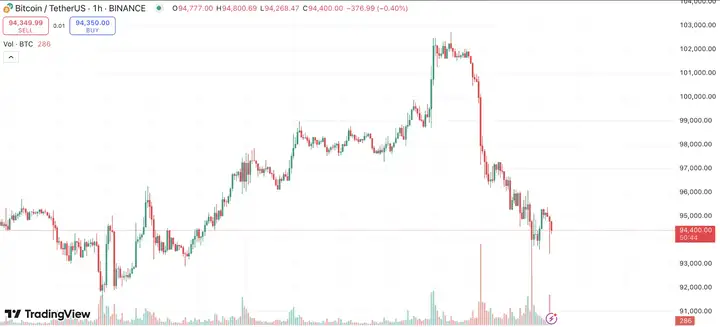On the morning of January 9th, as the market declined, major crypto media reported a bearish news that "the U.S. Department of Justice has approved the sale of $6.5 billion worth of Dark Web Silk Road BTC seized." This news caused BTC to plummet below $94,000.
VX: TTZS6308
It's really raining when the roof is leaking, and getting sick when Aunt Flo comes to visit.

Is the news true or false, and will it cause panic and a market crash?
First, the credibility of this news source is not high, and the official statement from the U.S. Department of Justice has not been verified. Even if the news is true, based on the Department of Justice's past procedures for selling seized BTC, they basically cannot sell these BTC in the short term, that is, before Trump takes office, and Trump has promised that the U.S. will not sell any BTC during his presidency.
In summary, the U.S. Department of Justice will not actually sell BTC at this stage, and it will not put selling pressure on the market.
The BTC seized by the U.S. Department of Justice is generally auctioned by the U.S. Marshals Service, not directly sold OTC or on exchanges. This is similar to the Department of Justice auctioning off seized real estate and other assets to generate revenue and remit it to the Treasury.
From the release of the news to the actual auction being held, and the auction winner actually receiving the BTC, and then selling it on the market, it may take a very long time.
At present, there are only 11 days left before Trump takes office, and no recent news has been found about the auction of seized BTC.
It can be seen that at least before Trump takes office, the U.S. Department of Justice will not actually sell the BTC seized from the Silk Road.
In summary, the news that spread this morning, which affected the market, that "the U.S. Department of Justice has approved the sale of $6.5 billion worth of Dark Web Silk Road BTC," is most likely false.
The U.S. government is not the first to sell BTC
In June 2014, the U.S. government publicly auctioned off BTC seized from the Silk Road for the first time. About 30,000 BTC were auctioned. The bidders included many investment institutions and individuals, and the well-known investor Tim Draper won the bid multiple times. In the subsequent auctions, the government sold the remaining BTC in batches.
After the auction was completed, the BTC price remained stable at around $600 and did not experience a "crash." The active bidding by institutional investors during the auction process also strengthened the "legitimacy" of BTC to a certain extent.
In December 2014, the second round of auction of 50,000 BTC, nearly twice the size of the first auction, also did not lead to a continuous plunge in the BTC price, which remained in the $300-$400 range.
In March 2015, another 50,000 BTC were auctioned, and by then BTC had rebounded from its previous low. The market's previous panic sentiment was further weakened, and the price stabilized quickly after fluctuating slightly between $280 and $300.
In November 2015, the hundreds of thousands of BTC auctioned by the U.S. government at the end of the year ultimately did not cause major market turmoil. On the contrary, as buyers competed fiercely, these auctions were interpreted as a symbol of BTC gradually gaining more "legitimate investment" status.
Until today, the U.S. Department of Justice has been authorized to liquidate the remaining 69,370 BTC (worth about $6.5 billion) seized in the Silk Road case, and the wallet address "bc1qa5" associated with Silk Road has been dormant for more than 4 years.
Based on the history of past sales, BTC prices may experience a brief price panic, but in the long run, as the U.S. government has previously adopted OTC auctions and is unlikely to dump at market prices, the negative impact on BTC prices will not last too long.
Even if the news that comes out later is true, the impact doesn't seem to be that big.
First, Trump said before that he won't let the U.S. sell BTC, and he's about to take office soon.
Second, even if they sell, they won't dump it all at once, like the German government and the U.S. government did before, selling a little bit each day.
Third, institutions are now scrambling to buy the cheap coins, so if they sell, someone will be there to buy them.
Based on the actual market capitalization, the capital that entered the market last year was $379 billion, about $1 billion per day. The $6.5 billion worth of BTC sold by the U.S. government can be absorbed in just one week, no need to panic.






